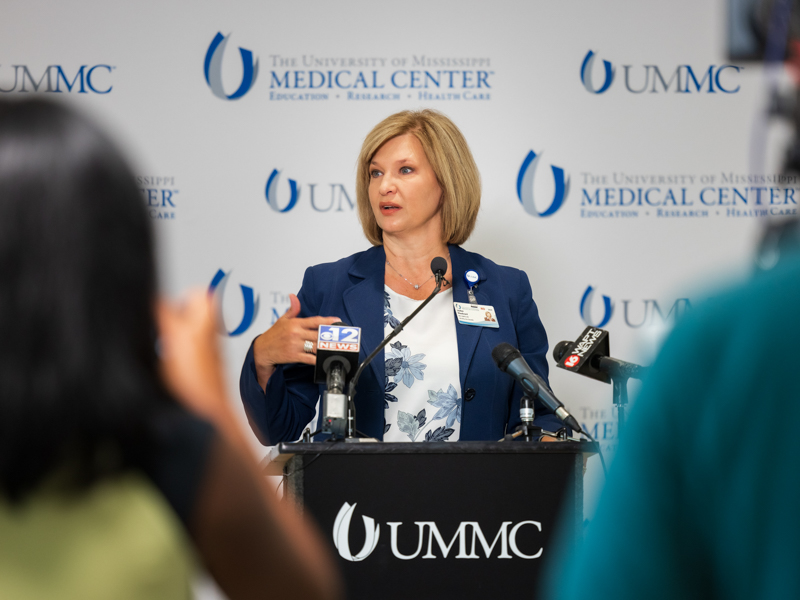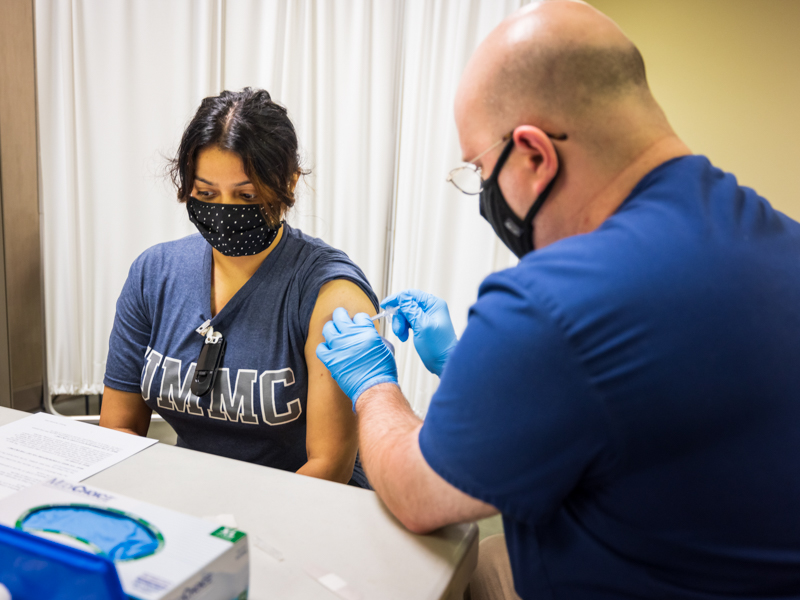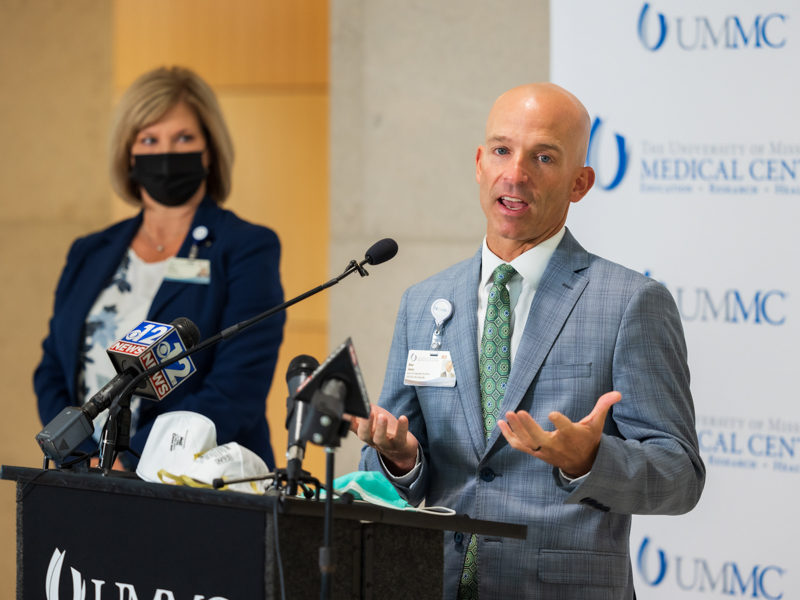COVID-19 vaccination policy puts patients, families' safety first

Editor’s note: This article was updated Oct. 19, 2021, to reflect updated COVID-19 masking and vaccine policy.
In drawing up a new University of Mississippi Medical Center COVID-19 vaccine policy, Dr. LouAnn Woodward and clinical leaders held sacred the safety of patients and families.
“The number one reason we are doing this is because we are taking care of the sickest of the sick. We feel strongly that this is the right thing to do,” said Woodward, vice chancellor for health affairs and dean of the School of Medicine.
The new policy requires anyone who works or learns in a UMMC-controlled space to be fully vaccinated against COVID-19, with limited exceptions, and to wear a mask at all times in Medical Center public areas. The masking and vaccine policy also applies to outside contractors and visiting students.
Current policy requires all visitors to wear a mask, regardless of their vaccine status. The Medical Center has about 9,500 employees and 3,000 students.
During a news conference Friday morning, Woodward and Dr. Alan Jones, associate vice chancellor for clinical affairs and COVID-19 clinical response leader, explained the policy is in keeping with UMMC’s commitment to a safe patient, working and learning environment. It also exemplifies the Medical Center’s role as a leading health care institution and only academic medical center in the state.

The policy is in accordance with Centers for Disease Control and Prevention and Mississippi State Department of Health recommendations. It goes into effect Monday, July 26 and will be phased in over three months, beginning with managers/supervisors, followed by direct-patient-care employees and then others not covered in the earlier phases.
On Friday, the Association of American Medical Colleges issued a strong statement urging its member institutions to require the vaccine for their employees in light of the alarming resurgence of COVID-19 cases.
Increasing evidence that the unvaccinated are the overwhelming majority of new hospitalizations, the AAMC said in a statement, “has emphasized the critical need to get individuals vaccinated and mitigate the spread of the virus.
“Nowhere is this more important than in hospitals, where health care personnel – who have been heroic during this pandemic – are caring for patients with a wide variety of health challenges under the assumption that the health care professionals treating them are not at risk of acquiring or transmitting COVID-19,” the statement said.
“We have thought about this carefully. The vaccine has been proven to be safe,” Woodward said. “We need to use the tool that we have.
“I acknowledge that this is not a popular decision with some people, but on balance, I think of the responsibility we have to our patients,” she said. “When we became health care professionals or chose to work or study in a health care environment, we accepted the responsibility to always do what’s in the best interests of our patients. This is one of those times.”

Although UMMC is the first hospital or health care system in the state to put forth such a policy, a number of other medical centers nationwide have already taken that step, Jones said.
On July 13, the Society for Healthcare Epidemiology issued a statement advocating that COVID-19 vaccinations be required for all health care personnel. Joining the society in its recommendation were six additional leading organizations representing medical professionals working in infectious diseases, infection prevention, pharmacy, pediatrics and long-term care.
“By requiring vaccination as a condition of employment we raise levels of vaccination for healthcare personnel, improve protection of our patients, and aid in reaching community protection,” said David J. Weber, a member of the SHEA Board of Trustees and lead author of the statement. “As health care personnel, we’re committed to these goals.”
The ethical responsibility the Medical Center has to enact its own policy, and the fact that it’s held to a higher standard, “goes beyond a personal choice,” Jones said.
The policy comes as COVID’s highly contagious Delta variant has become the prominent strain in Mississippi and much of the nation. At least 90 percent of the Medical Center’s COVID patients are unvaccinated, and the number of inpatients with COVID has doubled in the last week. The number of pediatric inpatients infected with COVID is among the highest of the pandemic.
The vaccine is “the most effective way to limit spread of the virus and lessen the chance for hospitalization,” Woodward said.
Woodward said it makes her heart heavy that some employees don’t want to be vaccinated. “The people who work here have a heart for our mission. The last thing we want to do is lose employees over this,” she said. “But at the end of the day, our obligation is to our patients.”
The Medical Center must do all it can to reach 100 percent vaccination, Jones said.
“We have to take a strong stand for our patients and be a leader in the state. We hope other health care organizations in the state will follow our lead.”
Once the Food and Drug Administration lifts the emergency use authorization designation from any vaccine that UMMC administers, the option to decline a vaccine other than for certain accommodations will no longer be available. At that time, receiving the COVID-19 vaccination will become a condition of employment or enrollment – similar to the UMMC policy requiring employees and students receive the flu vaccine annually.
Frequently asked questions about the COVID-19 vaccine can be found here. Watch a livestream recording of the July 16 news conference here.


